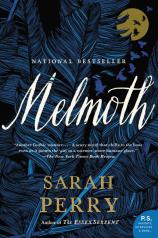Melmoth
Review
Melmoth
While doing research for MELMOTH, I turned to a novel dating back to the year 1820: MELMOTH THE WANDERER by Irish writer and clergyman Charles Maturin. Here, Melmoth represented someone who had made a deal with the devil for 150 more years of life and then wanders trying to find an individual to pass this “gift” off on. I also discovered that Maturin was Oscar Wilde’s uncle, and at one point Wilde called himself Sebastian Melmoth. Additionally, H.P. Lovecraft addresses a friend, Donald Wandrei, as Melmoth the Wandrei in letters.
This is quite a pedigree for Sarah Perry to draw upon for her latest work of fiction. The difference here is that Perry’s version of Melmoth is female, referred to as Melmoth the Witness, and is a witch-like character eternally damned for denying the resurrection of Jesus Christ. I'm already on board with this concept, and Perry's expertise in creating something in traditional gothic style, as demonstrated in her well-received novel THE ESSEX SERPENT, is quite evident in this tale.
"I always take solace when reading these types of novels as they appear to speak with a higher level of wisdom and morality that is sorely missing from many modern tales."
The book is told in events taking place between Melmoth and her circle of friends in Prague in the present day combined with a number of old letters they find, some dating back several centuries. The stories run the gamut from a young woman in 1930s Cairo; a junior Ottoman bureaucrat during WWI; a child in Nazi-occupied Czechoslovakia; a young man caring for his severely ill brother in Manila; and a desperate refugee from Central Africa, precariously seeking shelter in 2017 London.
Karel is obsessed with Melmoth and wants to find out more about her and what her purpose was in Josef Hoffman’s story. It is not long after reading the initial letters that Karel mysteriously disappears. Helen Franklin is unnerved by this and is curious as to why no one else, especially Thea, seems to be concerned about what might be behind his disappearance. An elderly woman named Albína Horáková professes that Karel was probably taken by Melmotka. The group learns by way of the letters set in different locations and time periods that the supernatural being Melmoth goes by different names.
Hoffman talks about how Melmoth, being damned to walk the earth for all of eternity as a witness, urges him to join her in her quest as she is so terribly lonely. The story, set in Turkey, features the characters known only as Nameless and Hassan. They are brothers, yet there is no good reason given initially as to why one of them is never named. The being they are faced with is known as Melmat, the woman who watches. The most profound statement in the novel comes from the father of Hassan and Nameless: “The battle of the mind is the war which can never be won.” This is a gothic tale that often tips towards madness, and this quote stayed with me during those moments.
Melmoth does have one common trait: her look. Her dark, flowing gowns and long black hair appear at times to be blowing in the wind or floating atop a body of water. Each tale finds Melmoth getting closer and closer to finding a companion to join her in her misery. But it is in the present time, amongst Helen and her friends, that Melmoth will find the one person who is so guilt-ridden by their own sin that they are willing to join Melmoth as another damned creature making penance by walking the earth to witness others who have greatly sinned.
Sarah Perry has found a nice niche as a writer of stories in the gothic style. I always take solace when reading these types of novels as they appear to speak with a higher level of wisdom and morality that is sorely missing from many modern tales.
Reviewed by Ray Palen on December 7, 2018




